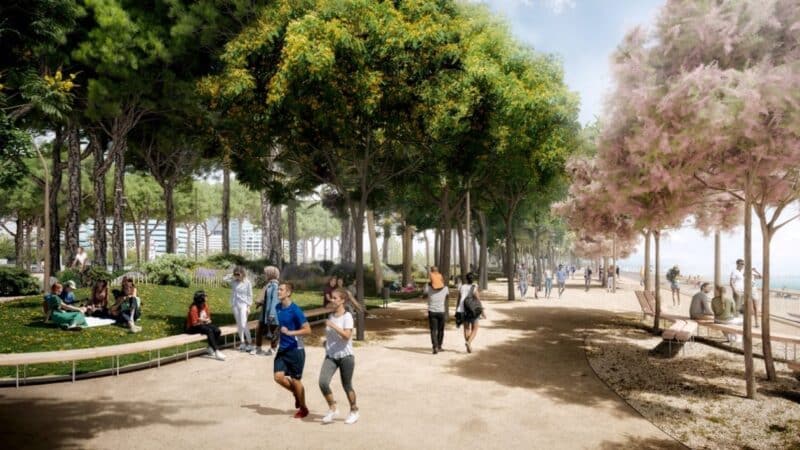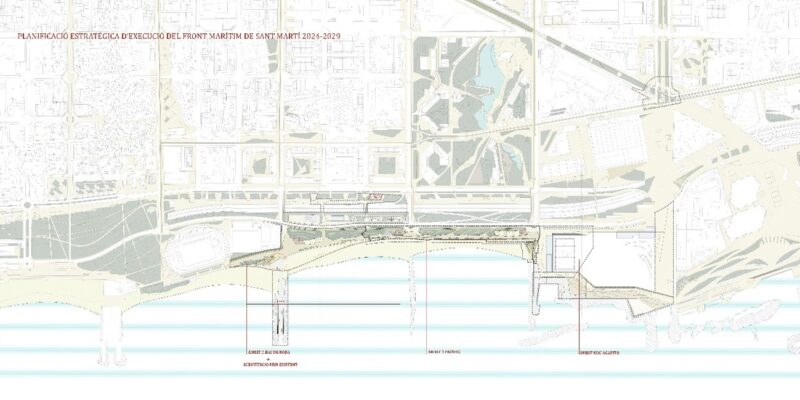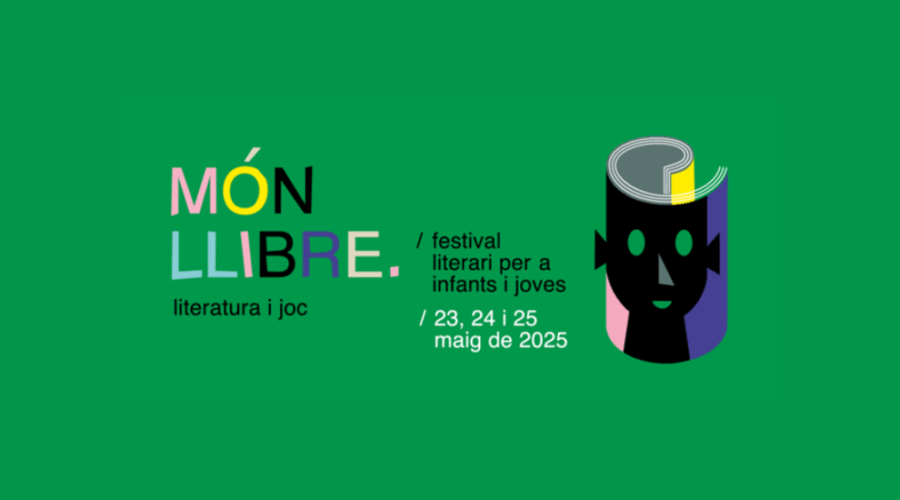The city of Barcelona, known for its vibrant culture and stunning architecture, is in the midst of a significant transformation of its waterfront. The redevelopment of the Mar Bella promenade, which stretches from Bac de Roda to the Plataforma Marina del Fòrum, seeks not only to beautify the waterfront, but also to address the challenges of climate change. This project promises to change the urban landscape and the way residents and visitors interact with the coastal space.
 Promoting climate-friendly urban planning
Promoting climate-friendly urban planning
Work on this central section of the Mar Bella promenade has already begun and is scheduled for completion in spring 2027. The climate urbanism approach is central to this initiative, which aims to create a resilient space, adapted to the effects of storms and preserving the Nova Mar Bella and Llevant beaches. This plan responds to the urgent need to prepare the city for the challenges of climate change, in line with the Climate Plan.
Challenge Barcelona Triathlon: International triathlon comes to the Mar Bella
However, the implementation of the project has had to adapt to inconveniences that arose after the initial approval of the plan in September 2023. Recent storms such as Ciarán and Domingos damaged the promenade wall and left the Nova Mar Bella without sand, which highlighted the need to rethink the strategy. Thus, the City Council opted to update the studies on maritime dynamics until 2080, determining modifications to the project that include removing part of the wall to maintain and reinforce the beach.
 Relocation of the Can Aranyó-Agapito Fernández soccer field.
Relocation of the Can Aranyó-Agapito Fernández soccer field.
The redevelopment also considers notable logistical marches, such as the relocation of the Can Aranyó-Agapito Fernández municipal soccer field. As the promenade wall is delayed, this move guarantees the construction of new stands and promises a permanent location for this important sports facility. Phase 2 of the work on the soccer field will begin in September 2027 and will be completed approximately one year later.
When the soccer field is finally relocated, the remaining space will be urbanized as part of the final phase (phase 3) of the project, which aims to complete the transformation of Barcelona’s waterfront. This strategy demonstrates the City Council’s commitment not to sacrifice essential elements of the community and to reinforce the sporting potential of the area.
The momentum of Pavelló Blau
One of the most outstanding transforming elements of the project is the Pavelló Blau. Visualized as a large public sports space of reference on Barcelona’s waterfront, it stretches five kilometers from Port Vell to Port Fòrum. Designed to accommodate some 40 sea-related sports practices, the Pavelló Blau reflects a vibrant expansion of sport and outdoor enjoyment in the city.
The creation of the Pavelló Blau is also congruent with other improvements in the area, such as the renovation of the Port Olímpic and the development of a new Water Sports Center. All of this underscores the ambition to increasingly integrate sport into everyday life, while reinforcing the naturalization and sustainability of the environment.
A walk in the service of the community
Upon completion of the works, the Mar Bella promenade will not only be more aesthetic and accessible, but will also prioritize safety and connectivity. With a minimum width of 12 meters for the pedestrian walkway and a 4-meter lane for bicycles and rollerblades, this space aims to revolutionize active mobility in the city.
In addition, the project includes the construction of large arrivals to the city that will act as welcome gates. These will welcome visitors with information, entertainment and modern amenities, such as beach bars and volleyball courts. Rest areas and green zones, representing 32% of the entire renovated area, will provide a space for relaxation.
The project’s green commitment is fundamental: 1,000 new trees of 17 different species will contribute to keeping the coastline shaded and cool. In terms of sustainable technological innovation, photovoltaic pergolas will be installed, providing new energy solutions.
This project will not only change the face of Barcelona’s waterfront; it has the potential to metamorphose the way locals and tourists experience and enjoy public space. The redevelopment of the Mar Bella promenade is a bold and necessary step towards a sustainable and active future.


 Promoting climate-friendly urban planning
Promoting climate-friendly urban planning Relocation of the Can Aranyó-Agapito Fernández soccer field.
Relocation of the Can Aranyó-Agapito Fernández soccer field.
